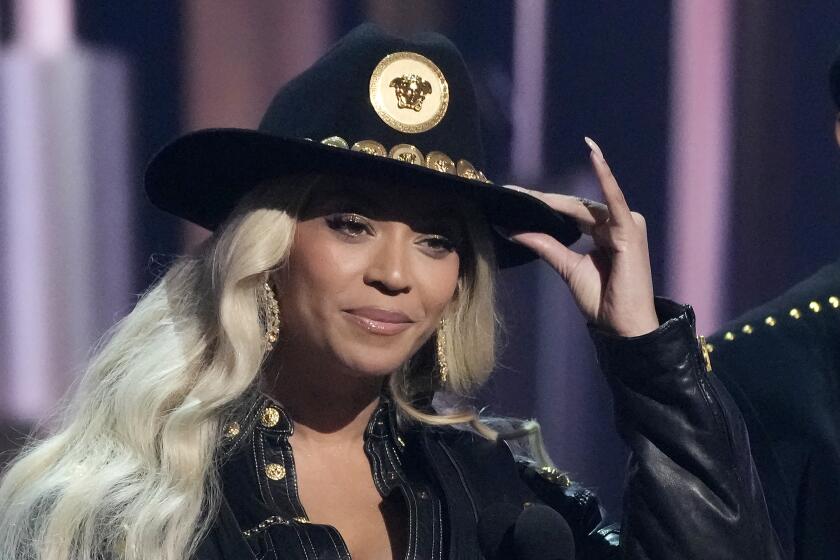Play It Again, Woody: You Got the Chops
Can Woody Allen really play jazz clarinet? Has he actually been delivering some meaningful jazz improvisations during all the years of performances at Michael’s Pub in the ‘80s, and more recently at the Cafe Carlyle in New York City?
Inquiring minds who can’t make it to Manhattan to hear the clarinetist / filmmaker in one of his gigs now have the opportunity to make their own appraisals with the arrival of “Wild Man Blues,” a feature-length documentary chronicling a 1996 European concert tour by Allen and his New Orleans Jazz Band.
The tour itself--Allen’s first, anywhere, as a jazz artist--came about unexpectedly.
“I was talking to a banjo player one day,” he recalls, “and we were remarking how New Orleans music was so appreciated in European cities, much more than in the United States. And we said, ‘Gee, we should do a tour there sometime, it would be fun to take the band.’ But when we mentioned it to other people, they took it very seriously, and before we knew it, they were coming in with offers of a significant tour.”
Allen went along with the project, hesitantly at first, but willingly--at least until he was on a plane, heading to Europe.
“And then I began thinking,” he continues, “My God, I’m not going to be home now for three weeks, and I’m going to have to do a different city almost every single night, go to the airport and back from the airport every day. And that’s when I started to have some reservations about it.”
He was somewhat more amenable to the proposed documentary, which was directed by two-time Academy Award winner Barbara Kopple. But he was “amazed” that Kopple “got anything out of the tour.”
In fact, Kopple’s film opens a fascinating window into the little-known skills of Allen as an immensely dedicated New Orleans jazz artist. He insists, however, that his devotion to the music, intense and well-meaning though it may be, does not compensate for what he perceives as his own lack of talent.
“I’m not saying this out of false modesty,” he says. “But when I play with bands, I am inevitably the worst player. But I’m always trying very hard. And I’m always playing at the very top of my ability. Whereas many of these musicians I’m playing with are such fine players that if anyone said to them, ‘Play “Scrapple From the Apple” or “Ornithology” or something,’ they would knock it off, just like that.
“But I’m a weekend golfer here. If I had to make a living as a musician, I would not be able to do it. And people do come to see me because I’ve done movies, and not really to hear my playing. But I’m enthused and honest, and I’m trying to play as best I can.”
Humility aside, however, Allen may be a bit hard on himself.
The scenes in the film focusing on his playing reveal some enthusiastic New Orleans-style improvising by Allen, rhythmically propulsive, and clearly tinged with both the sound and the character of Sidney Bechet and George Lewis, two legendary clarinetists he much admires. The fact is that, within the style, he is capable of producing some intriguing solos.
And, at times, even more than that. On one or two of the slower numbers, Allen plays with a warm, focused intensity that may be more revelatory of his inner nature than all the more typical documentary-style, filmed-over-the-shoulder segments in hotels, boats, airplanes and backstage dressing rooms.
But Allen maintains that the intensity has to do with his lifelong dedication to New Orleans music.
“I’ve heard so much Sidney Bechet,” he says, “so much George Lewis and Johnny Dodds, that it seeps into my bloodstream. And also it goes through the filter of my lack of musicianship. The people I’m talking about were primitive and all that, but they were geniuses.
“I don’t have that sort of ability. So what you hear is something that’s redolent of them. If you’re familiar with jazz, you can pick up feelings of theirs, phrases of theirs, intonations of theirs and instincts of theirs, filtered through a completely well-meaning but harmless New York Jewish clarinet player.”
It was a filtering process that was a long time coming. And what “Wild Man Blues” does not disclose about the jazz-playing Allen is the curious process that eventually led him to risk, in his words, the “possible humiliation” of public performances as a jazz man.
“I grew up when the music on the radio was Benny Goodman and Tommy Dorsey and Frank Sinatra, the Cole Porter songs,” says Allen. “And I had a wonderful, wonderful childhood with beautiful music coming at me all the time. This was the early ‘40s. But then, when I was about 14, I just happened to be listening to the radio in New York and heard a concert of Sidney Bechet’s from France. I thought it was astonishing music, and for the first time I wasn’t just appreciating the music, but I was inspired to learn to play.
“I thought, ‘Gee, I want to do that.’ Not realizing that he was a genius, and I was the opposite. So I started to learn the soprano saxophone, and gradually switched over to the clarinet, because Bechet also played that.”
He essentially did it on his own, playing along to old 78 rpm recordings of New Orleans music, never learning to read music, picking up pointers along the way. In one of the documentary’s most fascinating scenes, Allen’s mother whimsically recalls the many hours he spent, as a child, alone in his room.
“It’s true,” he says. “I originally practiced only in my room, by myself, and not with other people. This was well into my adulthood. I’d play along with records--Sidney Bechet, Bunk Johnson. Sometimes I’d play along with what they were playing, sometimes I’d improvise. Then, when I was appearing at the Hungry i in San Francisco, and I watched Turk Murphy, who was at Earthquake McGoon’s, he said, ‘Bring your clarinet and sit in.’ I was much too nervous, but Turk wouldn’t take no for an answer.
“And after I did, I found I liked playing with other people. So I started doing it in New York at the Living Room, and then the guy in the Living Room said, ‘Let’s play in a club,’ and I said, ‘OK.’ I couldn’t have cared less if we did or not, but we did and that sort of got to be a nice experience.”
The success of the tour has led to speculation about a possible series of concerts in this country. But Allen, ever true to his skepticism, has serious doubts about the reception such a tour might receive.
“I don’t think anyone would come,” he says. “Just as I didn’t think they’d come in Europe. There I was proven wrong, but here I think I’d be proven right.”
Pushed to say anything positive about his playing, Allen finally, reluctantly, manages a kind of left-handed compliment. And in doing so, he reveals how important his jazz playing has been, and continues to be, and why--even now, at 63--he practices every day.
Asked if there is any part of his personality that is more present in his music than in his filmmaking, he replies, “I think my warmth. Because unless people know me, they don’t think I’m as warm as I really am. They think that I’m cerebral, that I’m intellectual, which I’m not. They think that I lock myself in my room and write, and I’m very disciplined--things that are associated with a cooler, more in-control thing.
“But the truth is that I have a great affection for things warm. And I think that when I play, you can get, from me, some of the warmth that I feel. It’s there, in the music, that it is really detectable.”
“Wild Man Blues,” the recording, featuring Allen and most of the players from the European tour, is scheduled to be issued on Atlantic Records later this year. Although it includes three tunes performed in the documentary, it is a studio rather than a soundtrack album. But it, too, provides intriguing insights into Allen, the dedicated musician.
And, typically, its release has been delayed by Allen’s quest for a “big, warm sound”--one which, to his ears, was diminished in the transfer from the analog studio sound to the digital CD sound.
At this writing, he was still trying to persuade the technicians to find a way to reproduce his elusive audio perception of New Orleans music.
More to Read
The biggest entertainment stories
Get our big stories about Hollywood, film, television, music, arts, culture and more right in your inbox as soon as they publish.
You may occasionally receive promotional content from the Los Angeles Times.










